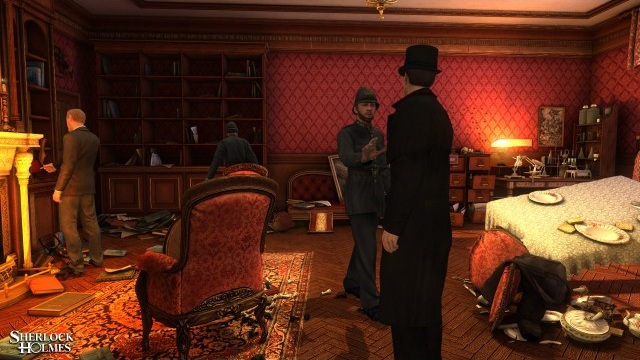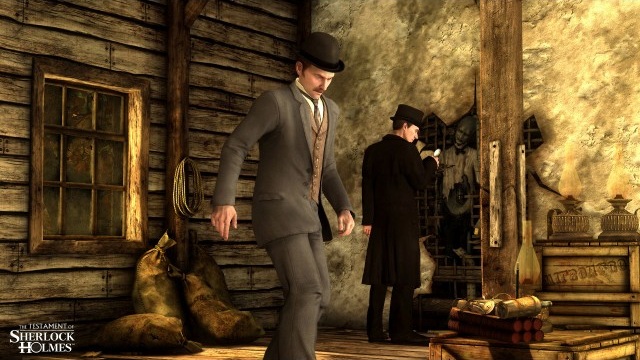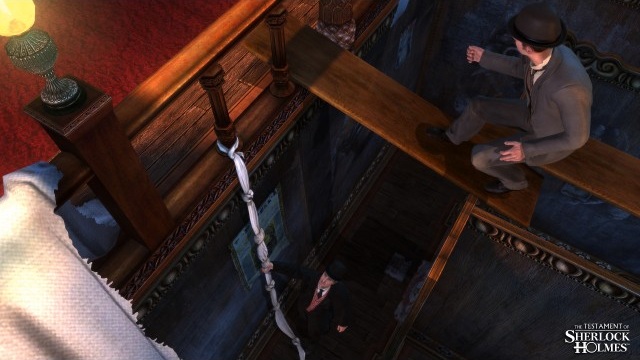Facts I learned from this videogame: Sherlock Holmes never says “Elementary, my dear Watson!” in any of the original stories. Also he is an asshole.
Testament of Sherlock Holmes is the sixth in Frogwares' series of Sherlock Holmes adventure games that continue the character's adventures beyond the stories of original author Sir Arthur Conan Doyle. The game makes frequent references to prior games in the series in which Holmes faced off against Jack the Ripper and fictional French thief Arsène Lupin, but these are mostly just fun asides and do not detract from the overall gameplay.
Testament is a throwback that should catch the eye of adventure game enthusiasts. It has made some changes in the format to account for modern audiences. It's possible to play in third-person, but the game is easier to play in first-person and has been (largely) optimized for console controls. However, the actual gameplay is pure old-school Rube Goldberg-style adventure.
This works both as an advantage and as a disadvantage. Many chests or doors are unlocked by solving a variety of puzzles. The math puzzles, for instance, are similar to those found in the Professor Layton series (though there are fewer of them) and mainly focus on simple arithmetic and numerical sequences. These are only problematic when there is little to no explanation of the process needed to solve the puzzle. In more than one instance, it took forever to solve a puzzle because it was unclear that a cursor could even be moved away from the default set of objects (one place where these puzzles must be simplified with the use of a mouse).
Most of the gameplay follows the standard adventure game quest model of find-these-items to activate the puzzle, then waiting while Holmes explains what happened in a room or what an antagonist did, after exclaiming “It is simplicity itself!” (Get used to that exclamation, and “No, it is unnecessary.” because you will hear those a lot over the course of the game.
The most intriguing part of the gameplay is the use of the deduction board. This gameplay element allows you to place clues onto a board and guide Holmes and Watson to a conclusion about them. When you make the correct inferences, the clues become fixed and a new set of choices are available on the board. In this way, the game gives you the option of being Holmes and living his process. The most unfortunate thing about the game is that this is only used three times.

Gameplay in the adventure-game and deduction board sections of the game does bog down in a few places where, even if you know the answer to a puzzle, the game wants you to drag the character along a set path before you can solve it. A certain chain of events must occur before some puzzles become solvable. This was particularly frustrating when, given all the available information, Holmes and Watson needed to solve a puzzle where a student was sitting in a classroom, which had to be determined using seating chart. However, since I had not clicked on everything in the room I was supposed to, approaching the seating chart just caused Holmes to say, “This plan is useless,” which greatly increased my frustration.
This also happens with the deduction board, where in one section of the game you could even place cards on it and select all the correct options. However, it would not confirm the choices until the player had performed several other tasks. Additionally, sometimes a wrong deduction makes as much sense as a correct one. Still, these were just minor annoyances, and the game avoids the “clicking on everything in the room” issue by allowing the player to use Holmes's instinct (attached to a button press) to see all the clues available in his field of vision.
The story is framed by scenes of Holmes' and Watson's grandchildren, who have discovered the adventure hidden in a pair of Holmes and Watson marionettes. This framing device is completely unnecessary, and the 3D models of the children look creepy. The game looks a little stilted and animations are stiff, but for a value title with a lot of content, it's fine and some of the environments are beautiful in a way that recalls old-school single screen adventure games of the mid-'90s. While there are some visual hiccups, the problems of the plot in general take precedence.

Perhaps owing to the success of the BBC series, the developers decided to highlight Holmes's darker side, up to and including murder as being justifiable to achieve his goals. Not explaining his motives to Watson (whose perspective the game follows), Holmes increasingly appears to be a deranged madman whose actions are indefensible. In the last act of the game, this narrative shifts dramatically in the opposite direction but lacks the storytelling ability to pull it off, making Sherlock Holmes seem like a capricious douchebag, instead of a calculating intellectual genius. Even this is undercut by the game's saccharine ending, which comes out of nowhere and begs you to ask more questions than it can possible answer.
Adventure game fans may be delighted by this return to the old-school style game from Frogwares. However, more casual fans of the genre may find Telltale's approach more accessible and graphically strong. Fans of the genre, or of prior entries in the series, will probably want to pick it up, for everyone else it may be an anachronistic curiosity.
-
Old-school adventure!
-
Can't solve puzzles out of sequence
-
Sherlock Holmes as a sociopath
-
Characters not supported by plot
-
Detection mode is fun
-
Some wrong deductions make as much sense as the correct ones
-
Poor animation/modeling on nonessential characters
-
Saccharine WTF ending







